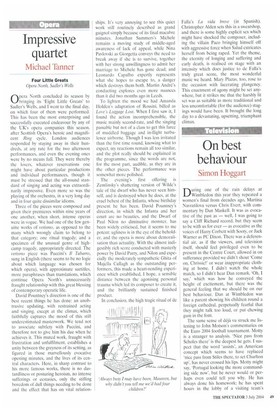Impressive quartet
Michael Tanner
Four Little Greats Opera North, Sadler's Wells
Qpera North concluded its season by bringing its 'Eight Little Greats' to Sadler's Wells, and I went to the final day, on which four of them were performed. This has been the most enterprising and successfully executed endeavour by any of the UK's opera companies this season, after Scottish Opera's heroic and magnificent Ring cycle. London audiences responded by staying away in their hundreds, at any rate for the two afternoon performances, and even the evening ones were by no means full. They were thereby the losers, whatever reservations one might have about particular productions and individual performances, though it must be stressed that the all-round standard of singing and acting was extraordinarily impressive. Even more so was the playing of the orchestra, in a very long day and in four quite dissimilar idioms.
Three of the pieces were composed and given their premieres within nine years of one another, when short, intense operas were in vogue. We had one of the few genuine works of verismo, as opposed to the many which wrongly claim to belong to that category; one ritual tragedy; and a specimen of the unusual genre of highcamp tragedy, appropriately directed. The verismo piece was Puccini's 11 Tabarro, sung in English (there seems to be no logic about which language was chosen for which opera), with approximate surtitles, more paraphrases than translations, which continue Opera North's unnecessarily fraught relationship with this great blessing of contemporary operatic life.
David Pountney's direction is one of the best recent things he has done: an unobtrusive updating, with restrained acting and singing, except at the climax, which faithfully captures the mood of this still underestimated masterwork. We tend not to associate subtlety with Puccini, and therefore not to give him his due when he achieves it. This muted work, fraught with frustration and unfulfilment, establishes a unity between the greyness of its setting, as figured in those marvellously evocative opening minutes, and the lives of its central characters. Here, in sharp contrast to his more famous works, there is no dastardliness or posturing heroism, no intense sufferings or ecstasies, only the stifling boredom of dull things needing to be done and the effect that has on vital relation
ships. It's very annoying to see this quiet work still routinely described as grand guignol simply because of its final macabre minutes. Jonathan Summers's Michele remains a moving study of middle-aged awareness of lack of appeal, while Nina Pavlovski as Giorgetta conveys the need to break away if she is to survive, together with her strong unwillingness to admit her marriage to Michele has gone dead; and Leonardo Capalbo expertly represents what she hopes to escape to, a danger which destroys them both. Martin Andre's conducting explores even more nuances than it did two months ago in Leeds.
To lighten the mood we had Amanda Holden's adaptation of Rossini, billed as Love's Luggage Lost, When I first saw it, I found the action incomprehensible, the music mainly second-rate, and the singing passable but not of a class to get this farce of muddled baggage and in-flight turbulence airborne. Though I was less irritated than the first time round, knowing what to expect, my reactions remain all too similar, and the plot really should be explained in the programme, since the words are not, for the most part, audible, as they are in the other pieces. The performance was somewhat more polished.
The evening's first offering is Zemlinsk-y's shattering version of Wilde's tale of the dwarf who has never seen himself, and is destroyed when he does, at the cruel behest of the Infanta, whose birthday present he has been. David Pountney's direction, in which the Infanta and her court are no beauties, and the Dwarf of Paul Nilon no diminutive monster, has been widely criticised, but it seems to me potent: ugliness is in the eye of the beholder, and the opera is more about demoralisation than actuality. With the almost indigestibly rich score conducted with masterly power by David Parry, and Nilon and especially the moderately sympathetic Ghita of Majella Cullagh as the outstanding performers, this made a heart-rending experience which established, I hope, a sensible distance between the agonising personal trauma which led its composer to create it. and the brilliantly sustained finished product.
In conclusion, the high tragic ritual of de Falla's La vida breve (in Spanish). Christopher Alden sets this in a sweatshop, and there is some highly explicit sex which might have shocked the composer, including the villain Paco bringing himself off with aggressive force when Salud extricates herself from being raped. Yet the theme, the eternity of longing and suffering and early death, is realised on stage with an intensity which does justice to de Falla's truly great score, the most wonderful music we heard. Mary Plazas, too, rose to the occasion with lacerating plangency. This enactment of agony might be set anywhere, but it strikes me that the harshly lit set was as suitable as more traditional and less uncomfortable (for the audience) stagings would have been. It brought the long day to a devastating, upsetting, triumphant climax.


































































 Previous page
Previous page